17 unsung Les Paul legends
Ask MusicRadar: your axe-wielding heroes revealed
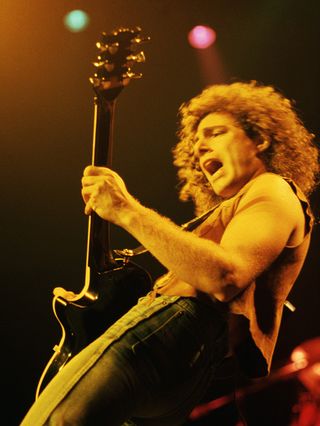
Neal Schon
MusicRadar’s gallery of Les Paul legends celebrates the 29 greatest players of Gibson’s iconic guitar. But what about the unsung heroes? The guitarists who’ve made music history with a Les Paul, but don’t have the legendary status of Slash, Jimmy Page or Pete Townshend?
We asked, you answered, and this is a gallery of the results: the top 17 unsung Les Paul Legends as voted for by you. First up: Journey’s Neal Schon…
Journey have recently enjoyed a return to the spotlight (or, the charts, to be precise) in the UK thanks to Simon Cowell’s relentless X Factor cover versions. Neal Schon is the only band member to play on every Journey album.
Apparently, Schon’s first electric guitar - a Gibson ES-335 - was (fatefully?) stolen and replaced with the 1956 Les Paul Goldtop with which the guitarist is so synonymous today.
Schon also boasts a signature Gibson Custom Les Paul with (from the 2005 press release): “Floyd Rose tremolo unit, a dramatically sculpted neck/body joint for easier upper fret access, and a Fernandes Sustainer pickup for the screaming lead parts he is famous for.” Not to mention the “Schon Custom slim-taper neck profile…”
Your votes:
“Where's Neal Schon - Journey WTF!!!” (Thanks, suityou316)
"This list of legends is not complete without Neal Schon. Check out any Journey album for proof." (From Chris via email, thanks)
Next: Alex Lifeson
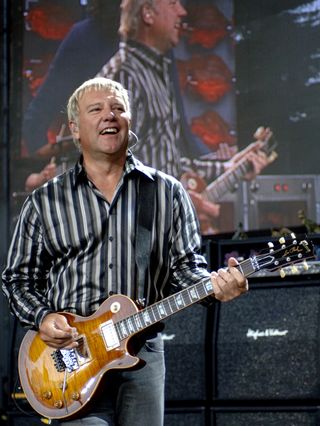
Alex Lifeson
You may well associate Alex Lifeson with an ES-355 (thanks in part to his signature model) as much, if not more than with a Les Paul. And that’s one of the reasons the founding member of prog legends Rush didn’t make our original countdown.
But like many guitarists of his ilk, Lifeson refuses to be tied down to just one model, having dabbled with Strats, PRS Guitars, mandolins and bouzoukis over the years. The top two, however, remain the ES-355 and the Les Paul - and Alex Lifeson deserves a nod for both.
You can read MusicRadar’s interview with Alex Lifeson here.
Your votes:
“Alex Lifeson.” (Thanks, bbcoz)
"Rush are an inspiration for me, especially Alex Lifeson's guitar work. That's what got me started!" (From David via email, thanks)
Next: Joe Bonamassa

Joe Bonamassa
"For me to be myself, I have to play a Les Paul. I plug it in and it sounds like me - exactly the way I’m supposed to sound. Anything else just doesn’t make sense," says Joe Bonamassa.
Now we know what you’re thinking: ‘how can anyone who makes the cover of Guitarist twice within the space of a year be called an unsung legend of anything?’ And you’re right. The fact that one of today’s brightest stars of blues rock doesn’t get more credit is a travesty. Luckily, despite the populists, any guitarist worth his weight in strings knows that Joe Bonamassa is the man.
Plus you couldn’t mistake that signature Goldtop if you tried…
Your votes:
“Joe Bonamassa.” (Thanks, bbcoz)
"Where is Joe Bonamassa? The man was born holding a Les Paul." (From Oz via email, thanks)
Next: Robert Fripp
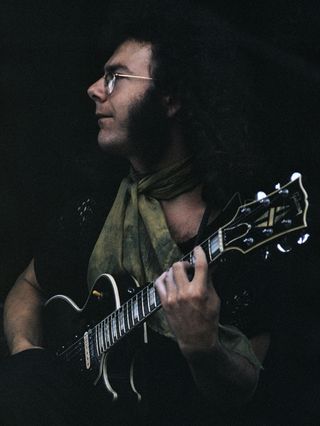
Robert Fripp
Part of Joe Satriani’s G3 guitar powerhouse in 2004, the only constant member of rockers King Crimson and boasting a collaboration discography that reads like a veritable who’s who of ‘80s pop - Peter Gabriel, Blondie, Talking Heads and David Bowie (check out the guitar playing on Heroes) to name but a few - Robert Fripp has cemented himself as one of the most respected guitarists of all time.
Axe of choice? Gibson Les Paul Custom.
Non guitar-related fact: Robert Fripp worked at Microsoft's studios to record new sounds and atmospheres for Windows Vista. From Fripp’s diary on DGMlive.com: “…in addition to 200 million Vista users with the 4 note splash, an extract from the Soundscapes’ Vista sessions is estimated to strike up 91% of 32 trillion times on the new MS Mail programme this year. So, one of the planet’s least popular music forms will also be the planet’s most sounded in 2008. This has to be some kind of a record.”
Your votes:
“Robert Fripp.” (Thanks, bbcoz)
“Robert Fripp… Aaron Fletcher out of The Bees.” (Thanks, DannyP)
Next: Duane Allman
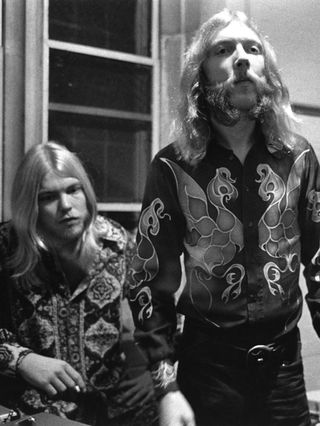
Duane Allman
The late Duane Allman of The Allman Brothers Band is still as revered today for his technique as he was during his relatively short-lived career. Most notably playing slide and lead guitar alongside Eric Clapton on Derek And The Dominos’ Layla And Other Assorted Love Songs LP.
In 2003 Rolling Stone ranked Duane Allman as the second greatest player of all time behind only Jimi Hendrix. So he’s hardly ‘unsung’. Unfortunately, while his band were and still are held in mightily high-regard, the ‘Brothers are often overlooked outside of the US. Hence his absence from our original countdown.
Allman used a 1957 Les Paul Goldtop and was honoured with a 1959 Tobacco Sunburst signature model.
Your votes:
“Duane Allman.” (Thanks, bbcoz)
"Duane Allman deserves some credit here - oustanding player." (Thanks, Steve)
Next: Steve Hackett
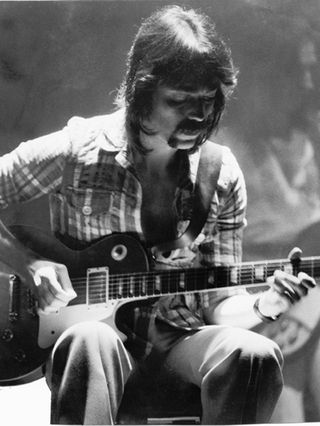
Steve Hackett
Steve Hackett joined Genesis in 1970, remaining with the band throughout the ‘classic' era (from 1971) and when Peter Gabriel left and Phil Collins took centre stage (in 1975). Eight albums later, Hackett left to go solo in 1977, forming prog supergroup GTR with Yes and Asia’s Steve Howe along the way.
You can check out a list of the prolific guitarist’s gear circa 1976 here… including a Les Paul Custom.
Your votes:
“Steve Hackett, definitely.” (Thanks, jalapeno)
“Cant argue with any of these but poor old Steve Hackett left out again.” (Thanks, bbcoz)
“Does anybody here know Mr Hackett at all? He's never been that showman as some others mentioned here. He is even a somewhat forgotten musician but his and his LP's contribution to early Genesis sound is undeniable. Even today he is still creating some good guitar oriented music.” (Thanks, unifaun)
Next: Snowy White

Snowy White
Snowy White loves his Gibson Les Paul Goldtop so much he named his 1995 compilation - Goldtop - after it. Snowy (real name Terence Charles) was a permanent member of Thin Lizzy from 1979 to 1981, of Pink Floyd in 1977 and during The Wall shows in 1980 and of Roger Waters’ band from 1990.
He also managed a top 10 hit in the UK with 1983 solo effort Bird Of Paradise.
Your votes:
“Fair list so far. What about… Snowy White?” (Thanks, connorr)
"Snowy White is a bit of a ledge!" (Thanks, Marty)
Next: John Sykes
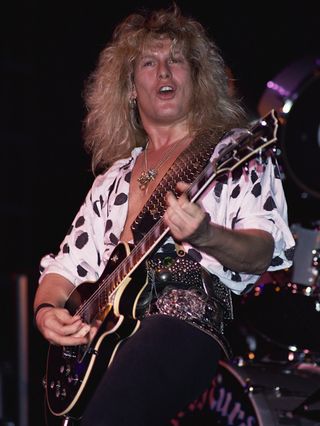
John Sykes
John Sykes replaced fellow unsung legend Snowy White in Thin Lizzy in 1983 and, at Phil Lynott’s suggestion, modified his worn, black 1978 Gibson Les Paul Custom with new “pickup mounting rings, pickguard and toggle switch plate from the stock Gibson parts to pieces made of chrome.”
Since then, whether it was with Thin Lizzy, Whitesnake, Badlands, Blue Murder, Tygers Of Pan Tang, Streetfighter or solo - according to John Sykes’ own guitar page - that very Les Paul “has been used for thousands of shows and on every recording John has made for the last 20 years.”
Of course, Gibson paid tribute by adding Sykes’s model to the Inspired By range in 2006.
Your votes:
“John Sykes.” (Thanks, LordOfTheStance)
"How about John Sykes? Thin Lizzy rock! (Thanks, Peter)
Next: Doug Aldrich
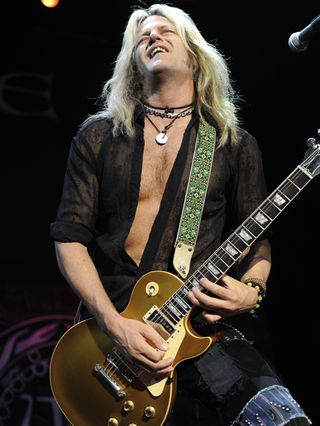
Doug Aldrich
Although previously a Jackson Guitars endorsee (he had a signature model), current Whitesnake guitarist Doug Aldrich has always counted Fender Strats and Gibson Les Pauls among his preferred arsenal.
Among his extensive lineup of vintage axes sit a 1978 LP Pro, a 1978 LP Custom and a 1981 LP Custom. You can check out Aldrich’s full collection here.
Your votes:
“Doug Aldrich.” (Thanks, LordOfTheStance)
"Pretty sure Doug Aldrich is a Les Paul man - deserves a place in this list if he is." (Thanks, Simon)
Next: Johnny Thunders
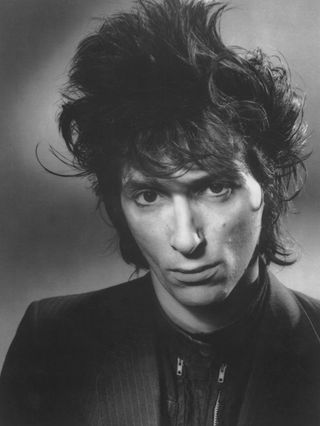
Johnny Thunders
The late Johnny Thunders was a founding member of protopunks New York Dolls and later The Heartbreakers with Richard Hell of fellow NY trailblazers Television. While his playing career was cut short at just 38 years old in a drug-fuelled mystery, the guitarist was never far away from a Gibson Les Paul Junior or Les Paul Special throughout it.
Your votes:
“Unsung LP users worth mentioning: Johnny Thunders.” (Thanks, Gojirosan)
"New York Dolls' guitarist Johnny Thunders." (Thanks, Mark)
Next: Paul McCartney
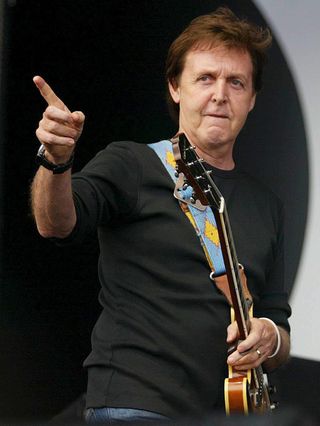
Paul McCartney
Whether it had four or six strings, you could probably add the ‘legend’ moniker after any guitar Paul McCartney ever touched. Up there with the ubiquitous Hofner ‘violin’ bass, the Rickenbacker and the Epiphone Casino, however, easily sits Macca’s penchant for Les Pauls.
Here’s a quote from Guitar Player magazine’s interview with Sir Paul in July 1990: “On-stage I wanted something that I knew was great. And I know Les Pauls are great. I wanted something reliable. And I know you can get subtle tones and subtle combinations of sounds [with Les Pauls].”
High praise indeed! (Via Gibson.com)
Your votes:
“Paul McCartney.” (Thanks, bbcoz)
"Paul McCartney - sure he plays Les Pauls sometimes. He's got quite a collection. And he's obviously a legend." (Thanks, George)
Next: Warren Haynes

Warren Haynes
Warren Haynes is a triple-threat guitar player if ever there was one. In addition to leading his own group, Gov't Mule, he's also a long-time member of The Allman Brothers Band and has played with The Dead since 2004.
While he may not have made the original all-rocking countdown of Les Paul luminaries, any guitarist honoured with their own signature axe - the Gibson Warren Haynes Les Paul Standard (part of the Inspired By series) - is more than worthy of this salute.
You can read MusicRadar’s interview with Warren Haynes here.
Your votes:
“Warren Haynes.” (Thanks, dhekalia)
"Warren Haynes deserves a nod - he's a great guy." (Thanks, Joe)
Next: Steve Clark
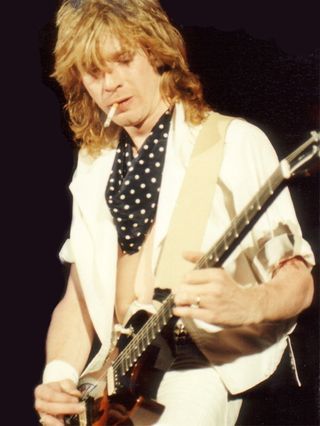
Steve Clark
Late Def Leppard guitarist and all-round ‘80s legend Steve Clark was a player and collector of Gibson guitars. Among them where Firebirds, EDS-1275 doublenecks (he had four additional doublenecks on order from Gibson at the time of his death according to his tribute site) and, of course, Les Pauls.
“Steve always stated that he was more of a traditionalist when it came to guitars. This can be seen in his selection of gear. At the time of his death, it was estimated that he owned approximately 75 guitars. I think it is safe to assume that a very large portion of those were Gibsons, and a large portion of those Gibsons were probably Les Pauls.” (Via Steveclarkguitar.com)
Your votes:
“Steve Clark.” (Thanks, BucketheadRules)
"Def Leppard forever!!! Steve Clark." (Thanks, Leo)
Next: Buckethead
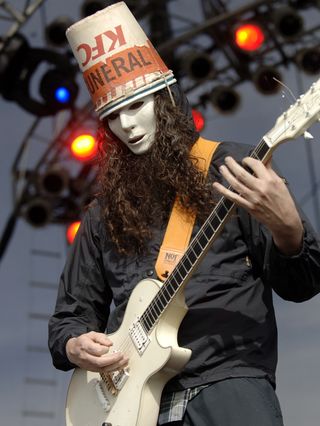
Buckethead
Yes! The guy with the KFC bucket on his head, expressionless white mask on his face and white Les Paul in his hands. As well as joining a long list of shredders to play in Guns N’ Roses at one time or another, Buckethead – real name Brian Carroll – boasts an almost as long a list of solo album releases: 28 and counting.
That white Les Paul is Buckethead’s chambered signature axe. Anyone capable of persuading Gibson to release a production model with arcade button-style kill switches must be doing something right. Respect.
Your votes:
“One of Buckethead's main guitars is an LP Custom which is completely white all over.” (Thanks, BucketheadRules)
"Buckethead is weird but he's an awesome shredder. And he's got a signature model." (Thanks, Nigel)
Next: Earl Slick
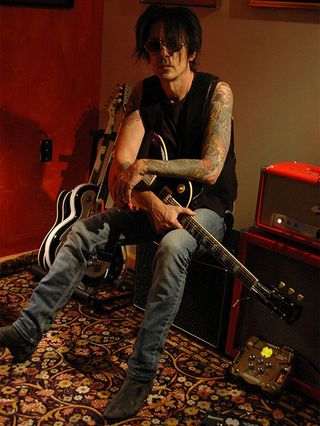
Earl Slick
Best-known as David Bowie’s young and talented replacement for Mick Ronson in 1974, Earl Slick’s guitar was a key element in the sound of three of Bowie’s albums from that period: David Live (1974), Young Americans (1975) and Station To Station (1976).
According to Gibson, Slick’s favourite axe is his Les Paul Standard with Bigsby. He also plays a Classic Double Cutaway LP in bullion gold finish. "I have a very basic way of playing the guitar, and it's all emotion-based - that's the only way I know how to do it," Slick says. "I think it's just the essence of that, that street thing… it comes naturally to me, that's how I play the guitar."
Your votes:
“Earl Slick.” (Thanks, bbcoz)
"Earl Slick. Anyone who can take over from Mick Ronson deserves some love. Both legendary in their own right." (From Rick via email, thanks)
Next: Mike Bloomfield
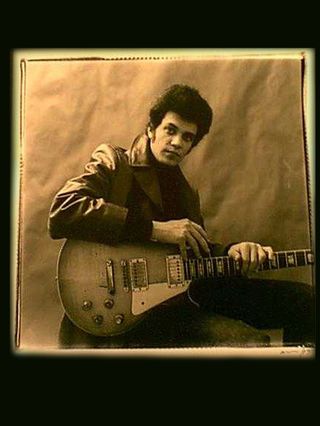
Mike Bloomfield
Another late ‘60s blues hero whose fluid technique, clean sound and use of the Gibson Les Paul still inspires the likes of Slash, Eric Johnson and fellow unsung legend Joe Bonamassa. If proof were needed of Bloomfield’s musical pedigree, look no further than his stinging lead work on Bob Dylan’s seminal Highway 61 Revisited.
The Gibson Custom Michael Bloomfield 1959 Les Paul Standard is a replica of his iconic '59 Standard, which (according to Bloomfield’s tribute site) was originally a trade in for his 1954 Les Paul Goldtop (and a $100) with guitar technician Dan Erlewine.
Your votes:
“Mike Bloomfield.” (Thanks, bbcoz)
"Michael Bloomfield is always forgotten about. Put him in!" (Thanks, Dwayne)
Next: Justin Hawkins

Justin Hawkins
It’s easy to mock the catsuit-wearing, high-pitched screaming, Les Paul waving rock god of love from Lowestoft, but, for at least five minutes back in 2003, Justin Hawkins and his band The Darkness single-handedly brought ‘proper' rock guitar playing back to the masses. Tight crotches, stupid hair, squealing solos and real musicianship.
For that, MusicRadar salutes his contribution. As did Gibson, who knocked out a limited run of signature Justin Hawkins Les Pauls and still roll him out to demo those complicated robot guitars from time to time.
Your votes:
“Remember The Darkness? Justin Hawkins was a legend for at least 10 minutes - and didn't Gibson give him a signature model? Oh, and don't even get me started on Hot Leg...” (Thanks, rabbitrabbit)
"The Darkness could really play - respect for Hawkins!" (thanks, Sam)
Next: who are the unsung Telecaster legends?
Tom Porter worked on MusicRadar from its mid-2007 launch date to 2011, covering a range of music and music making topics, across features, gear news, reviews, interviews and more. A regular NAMM-goer back in the day, Tom now resides permanently in Los Angeles, where he's doing rather well at the Internet Movie Database (IMDB).

“What we are after is not perfection. You’re looking for the flaws… the noise… earth hum. You’re looking for the arm-tight playing… the human aspect”: Opeth’s Mikael Åkerfeldt on inspirations, intuition, shred, and the problem with modern metal

“With proper playing dynamics, this creates a very cool effect that can sound like an exploding amp coming in and out of life”: EarthQuaker Devices and Lee Kiernan of IDLES introduce Gary, a drive/fuzz wildcard for maverick tone-seekers

“What we are after is not perfection. You’re looking for the flaws… the noise… earth hum. You’re looking for the arm-tight playing… the human aspect”: Opeth’s Mikael Åkerfeldt on inspirations, intuition, shred, and the problem with modern metal

“With proper playing dynamics, this creates a very cool effect that can sound like an exploding amp coming in and out of life”: EarthQuaker Devices and Lee Kiernan of IDLES introduce Gary, a drive/fuzz wildcard for maverick tone-seekers
Most Popular






